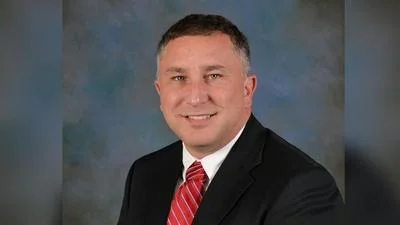Kankakee County State's Attorney Jim Rowe | Twitter
Kankakee County State's Attorney Jim Rowe | Twitter
Prosecution this past summer under a Gov. Pat Quinn-era revised eavesdropping law that placed a teenage Manteno Middle School student at the center of an international media storm ended in dismissal this week.
On Thursday, Kankakee County State's Attorney Jim Rowe, whose office has been prosecuting the case against the now 14-year-old Paul Boron on behalf of Manteno Community Unit School District No. 5, filed for dismissal.
"I'm just relieved and elated to know my son won't be mislabeled as a felon," Boron's mother, Leah McNally, was quoted in Illinois Policy Institute's announcement about the dismissal. "We are beyond grateful for all the help and support."

Teenage Manteno Middle School student Paul Boron with his mother, Leah McNally
| Illinois Policy Institute
Illinois Policy Institute, a Chicago-based nonprofit think tank, funded the student's legal defense with assistance from online donations. Illinois Policy Institute Senior Fellow and Elgin defense attorney David Camic coordinated Boron's defense.
Illinois Policy Institute is a strong advocate for reforming the state law that got Boron in trouble to begin with and is warning that the teenager won't the "last one caught in its crosshairs."
The case stemmed from a conversation Boron, then 13, recorded when he was called into the office of Manteno Middle School Principal David Conrad's office in February. About ten minutes into the conversation, Boron informed Conrad that their conversation was being recorded on the teenager's cell phone and the principal informed Boron that was committing a felony.
About two months later, Boron was charged with violating an eavesdropping law that had been signed by then Gov. Quinn in the waning days of his administration, in December 2014. Violating that law is considered a Class 4 felony in the state.
The idea behind the law was to make recording someone without their consent illegal again in Illinois shortly after the state Supreme Court ruled an older law to be unconstitutional.
In March 2014, the Illinois Supreme Court ruled unanimously in two separate cases, People v. Clark and People v. Melongo that Illinois eavesdropping statute, previously amended in 1994, violated the First Amendment and criminalized recording conversations without the consent of all parties. "Understandably, many people do not want their voices broadcast to others or on the Internet to be heard around the world," the high court ruled in Melongo.
"But, to a certain extent this is beyond our control, given the ubiquity of devices like smart phones, with their video and audio recording capabilities and the ability to post such recordings instantly to the Internet. Illinois’ privacy statute goes too far in its effort to protect individuals’ interest in the privacy of their communications. Indeed, by removing all semblance of privacy from the statute in the 1994 amendments, the legislature has 'severed the link between the eavesdropping statute’s means and its end.' The statute therefore burdens substantially more speech than is necessary to serve the interests the statute may legitimately serve."
Later in the year, the Illinois General Assembly came up with Senate Bill 1342, which passed overwhelmingly, 106-7 in the House and 46-4-1 in the Senate. "The new version is nearly as bad as the old one," the Illinois Policy Institute reported at the time.
Signing the legislation was one of Quinn's last official acts in 2014, despite calls for him to veto the bill.
Boron spent this past summer and fall at the center of a media storm reported locally, nationally and across the globe.
As his case progressed, the Illinois Policy Institute pointed out the case, and that of others charged under the revised law, re-raises questions in the debate about when anyone has a "reasonable" expectation of privacy. The cases also question whether it is fair to expect Illinois residents "to know where to draw that line in their everyday lives," the Illinois Policy Institute said in June.
State lawmakers considered tinkering with the revised law but most officials, particularly in Kankakee County, didn't want to talk about it as pressure mounted to drop the case against Boron and reform the eavesdropping law become more intense.
With this week's dismissal, Boron no longer faces a felony charge but other "others like him might not be so lucky" as the revised law remains in place, the Illinois Policy Institute said in its announcement Thursday.
"Illinois prosecutors have proven all too willing to bring charges for a variety of innocent-seeming conduct under the state’s eavesdropping law," the announcement said. "And without action from Springfield, it's unlikely Boron will be the last one caught in its crosshairs."






 Alerts Sign-up
Alerts Sign-up